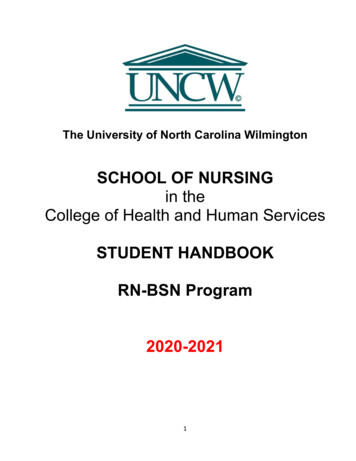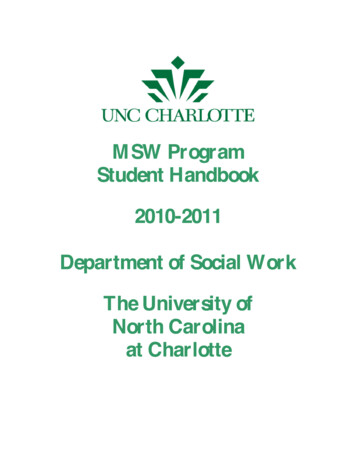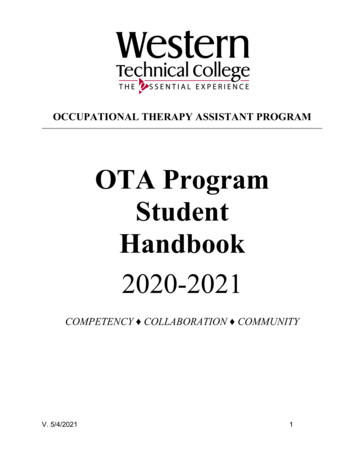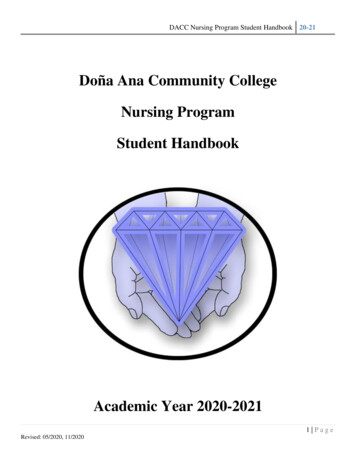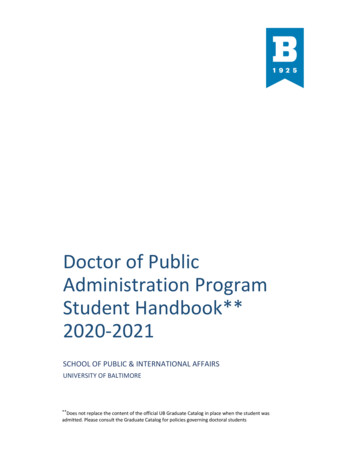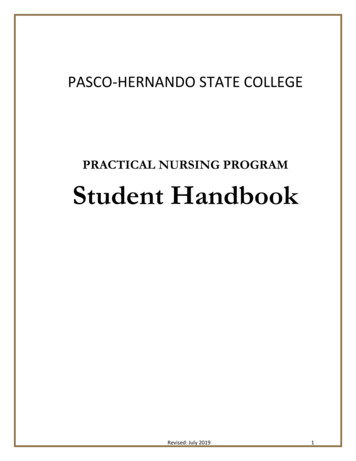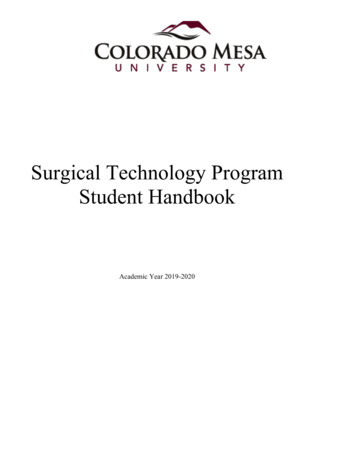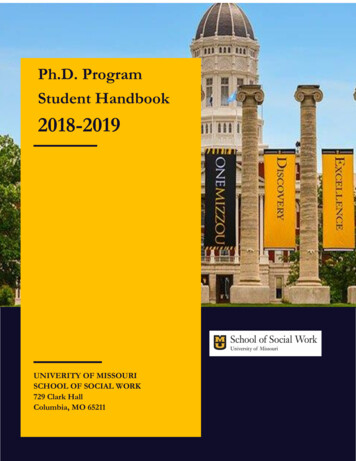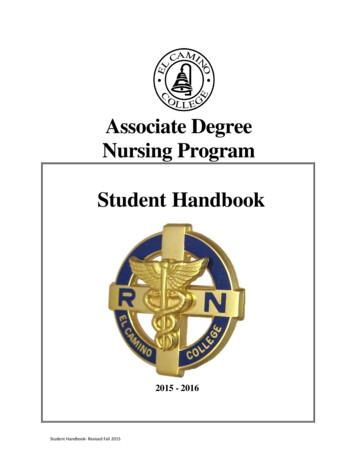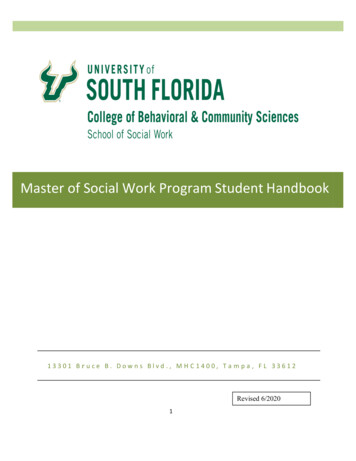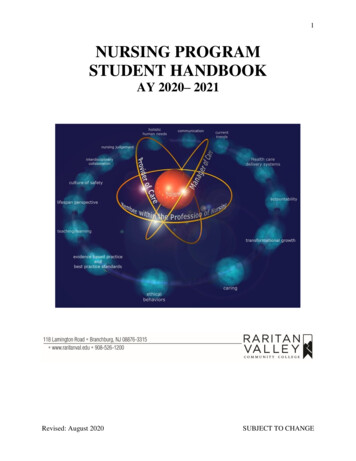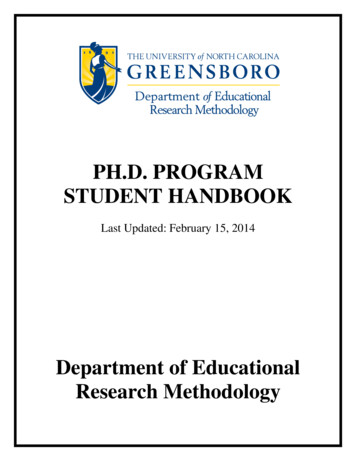
Transcription
PH.D. PROGRAMSTUDENT HANDBOOKLast Updated: February 15, 2014Department of EducationalResearch Methodology
TABLE OF CONTENTSPageINTRODUCTION. 1CURRICULUM AND RELATED ACTIVITIES . 2Ph.D. Degree Curricular Requirements . 2An Example Ph.D. Course Sequence . 2Schedule of Ph.D. Degree Activities . 3Expected Time-to-Completion. 3Practicums and Internships . 4Ph.D. Student Matching Process . 4DOCTORAL COMMITTEE . 5Selection of Doctoral Committee. 5Role of the Dissertation Committee . 6Dissertation Committee Chair. 6Members within the Department . 7Members outside the Department . 7Change of Committee Members . 7PROFESSIONAL INVOLVEMENT AND LEADERSHIP . 8FUNDING . 9TERMINATION FROM PROGRAM . 10DOCTORAL PLAN OF STUDY. 11Purpose. 11When to Complete the Plan of Study . 11Development of a Plan of Study . 11Making Changes to a Plan of Study . 12COMPREHENSIVE EXAMINATION . 13Purpose. 13When to Take the Comprehensive Examination. 13Examination Content . 13Written examination . 13Oral examination . 14Evaluation of the Examination. 14DISSERTATION . 15Preparation of Proposal . 15Human subjects . 15Presentation of proposal (Proposal seminar) . 15Admission to Candidacy . 16Dissertation Registration . 17Preparation of Dissertation . 17APA style manual . 17General sections of the dissertation . 17i
Dissertation outline. 18Dissertation Defense . 18Purpose . 18Location during program of study . 18Procedures . 19STUDENT CONDUCT AND ACADEMIC INTEGRITY . 21Student Conduct . 21Academic Integrity . 21MONITORING STUDENT PROGRESS . 23REVIEW—SALIENT ELEMENTS OF THE DOCTORAL DEGREE REQUIREMENT . 24LIST OF APPENDICES . 25APPENDICES . 26A: Resources . 26B: Recommendation for Doctoral Advisory/Dissertation Committee Appointment . 27C: Doctoral Plan of Study . 28D: Doctoral Plan of Study Revision . 32E: Report of Administration of Doctoral Preliminary Examination . 33F: Application for Admission to Candidacy . 34G: Recommendation for Doctoral Advisory/Dissertation Committee Revision . 35H: Dissertation Topic Approval . 36I: Sample Dissertation . 37J: Sample of Title Page . 39K: Sample of Approval Page . 40L: Final Oral Examination Schedule . 41M: Results of Oral Examination in Defense of Thesis/Dissertation . 42N: Transfer Credit . 43ii
INTRODUCTIONWe are pleased that you have selected the Department of Educational Research Methodology at TheUniversity of North Carolina at Greensboro to earn your doctoral degree in Educational ResearchMethodology. This guide was developed to give you an overview of the process you will follow as adoctoral student in the Ph.D. degree program. The guide covers everything from your initial admissioninto the Graduate School to your final dissertation defense and graduation.It is essential that this guide be used as an informational supplement to the UNCG Student Handbook, theThesis and Dissertation Manual, and the UNCG Graduate School Bulletin that was published the year thatyou were admitted into the Educational Research doctoral program. Furthermore, current informationfrom the Graduate School regarding important dates, times, and deadlines, etc., will be available in thatoffice and on their website at www.uncg.edu/grs. It is vital to follow the correct procedures andschedules for smooth progress through the program.This handbook for doctoral students is focused on the policies, procedures, and expectations specific tothe Department of Educational Research Methodology. The requirements and expectations described inthis handbook represent the minimum for all students. Depending on your interests, your doctoralcurriculum, and professional plans, you may be required to perform work over and above the minimum.These issues are determined in discussions with your advisor and/or your doctoral committee.New doctoral students are urged to read this handbook in its entirety, and to become familiar with theUniversity’s regulations and policies for graduate students as presented in the Graduate School Bulletin.Please consult with your advisor/chair if you have any questions or find any statements unclear. Youradvisor/chair will not necessarily remind you of each step you need to take. Students are expected to beknowledgeable of the contents of this handbook and other resources cited above as a way of takingresponsibility for their progress in the program.1
CURRICULUM AND RELATED ACTIVITIESPh.D. Degree Curricular RequirementsFor each student admitted into the Ph.D. program, the degree requirements are those specified in theUNCG Graduate School Bulletin for the academic year in which the student first enrolled in the Ph.D.degree program. Students are highly encouraged to become familiar with these degree requirements. Thecurrent version of the Graduate School Bulletin, as well as previous years’ versions, can be accessed fromhttp://grs.uncg.edu/bulletin.An Example Ph.D. Course SequenceThere is no single course sequence for the Ph.D. degree that applies to all students. Although there is anatural sequencing of some of the required courses, there is flexibility in when some of the required andelective courses can be taken. Thus, the course sequence will not be identical for all students.Despite the implicit variability in the sequencing, it is often useful for students to have an example of ageneral sequence that can be followed in scheduling their courses. An example of a course sequence forthe Ph.D. degree is provided below. It is stressed that this provides only an example of what a typicalcourse sequence would look like. Variations to this example always occur, and no student’s coursesequence will look precisely like this example. In particular, the specific timing and ordering of electivesare expected to vary depending on course offerings and the student’s plan of study.YEAR 1FallERM 642* (Program Evaluation)ERM 682* (Multivariate)ERM 669* (Item Response Theory)Elective@SpringERM 643* (Applied Evaluation)ERM 731* (SEM)ERM 675* (Data Presentation and Reporting)Elective@YEAR 2FallERM 732 (HLM, which is an Elective@)ERM 728* (EFA & CFA for Scale Construction)ERM 668* (Survey Research Methods)Elective@SpringERM 727* (Computer-Based Testing)ERM 729* (Advanced Item Response Theory)ERM 633* (Language Assessment and Testing)Elective@YEAR 3FallElective@Elective@Comprehensive ExamSpringERM 799* (Dissertation)ERM 799* (Dissertation)ERM 799* (Dissertation)ERM 799* (Dissertation)*Indicates a required course@Elective courses can include non-required ERM courses, courses outside of ERM (with the approval ofthe student’s doctoral committee), Practicum in Educational Research and Evaluation (ERM 730), andIndependent Study (ERM 692).2
Schedule of Ph.D. Degree ActivitiesWhile progressing through the Ph.D. degree program, there are numerous administrative and academicactivities that the student must complete in order to progress through the program and remain in goodstanding. The schedule of these activities is listed below.TimeYear 1: Prior to First SemesterActivity(i) Meet with assigned advisor to register for coursesYear 1: End of Spring Semester(i) Complete the Student Match Form(ii) Matching process is completed and “matched” advisor isassigned(iii) Assemble the Doctoral Committee(iv) Plan of Study is approved by Doctoral Committee andsubmitted to the Graduate School(v) Complete the Student Progress FormYear 2: Spring Semester(i) Complete Student Progress FormYear 3: Fall Semester(i) Complete the Ph.D. Comprehensive Exam*(ii) Apply for candidacy*(iii) Dissertation proposal defended*Year 3: Spring Semester(i) Dissertation oral defense*(ii) Dissertation acceptance form signed by Doctoral Committee(iii) Complete Student Progress Form(iv) Complete the Ph.D. Exit Survey*The specific timing of this may vary and will be determined in coordination with the student’s advisor.Expected Time-to-CompletionFor full-time students, the Ph.D. degree is expected to be completed within three to four years. Studentsbeginning the program in the fall semester are expected to complete the Comprehensive Exam by no laterthan the third year of enrollment.According to UNCG Graduate School policy, students enrolled in a Ph.D. degree program must completethe degree within seven years of initial enrollment. Thus, part-time students must complete the Ph.D.degree within this seven-year timeframe.Practicums and InternshipsStudents enrolled in the Ph.D. degree program often have the opportunity to gain practical experience inresearch methodology through completing a practicum or internship. While both practicums andinternships serve the same goal of giving the student hands-on experience related to her or his careerobjectives, there are differences between the two. In ERM, the distinction between a practicum andinternship is given as follows:Practicum. A practicum is an applied field experience that is typically conducted on a part-timebasis, and often in conjunction with the academic year (e.g., while taking courses). In general,practicums are applied field experiences with a high level of supervisory oversight by thesponsoring organization or mentor.3
Internship. An internship is an applied field experience that is typically conducted on a full-timebasis over a defined period of time (e.g., six weeks, etc.). In general, an internship in a particularorganization provides a working experience that is similar that of a regular full-time employee inthe organization.Students engaged in mentored applied field experiences – whether practicums or internships – mayreceive academic credit for these learning experiences by registering for ERM 730 “Practicum inEducational Research and Evaluation.” This is a three credit-hour mentored experience.Ph.D. Student Matching ProcessA primary goal of the Ph.D. program is to engage students in an active line of research that aligns with thestudent’s professional and scholarly interests. To facilitate this, ERM students in the Ph.D. program enterinto a matching process at the end of their first year of study in ERM. The intent of the matching processis to match each ERM student in the Ph.D. program with an ERM faculty member having professionaland/or research interests that align with those of the student.Upon entering ERM, students enrolled in the Ph.D. program are assigned an initial advisor who assists thestudent with the plan of study for the first year. In the spring semester of the first year of study, Ph.D.students complete the Student Match Form and based on the information provided in this form the studentis assigned to their “matched” advisor. In some instances, the initial faculty advisor will be the sameperson as the matched advisor, but in other instances they will differ. The resulting matched advisorserves as the student’s academic advisor, and as such has the responsibility of serving in an advisorycapacity for the student’s academic program of study, comprehensive exam, and dissertation.While the assignment of a matched advisor is intended to facilitate the student’s engagement in research,it does not preclude the student from engaging in research activities facilitated for ERM faculty who arenot the student’s matched advisor. Students may engage in research under the mentorship of, or incollaboration with, multiple ERM or UNCG faculty provided that such research activities support thestudent’s plan of studyStudents enrolled in the M.S./Ph.D. program are expected to have already engaged in the matchingprocess prior to matriculating the Ph.D. degree. Such students are not obligated to engage in the matchingprocess during their doctoral training because they would already have been matched to a faculty advisorduring their completion of the M.S. degree.4
DOCTORAL COMMITTEEYou must select two committees during the course of your doctoral work. Your doctoral Program ofStudy Committee approves your academic course work and serves as the committee for yourcomprehensive examination, which is typically taken upon completion of all of your approvedcoursework. Your doctoral Dissertation Committee—which may consist as the same members as yourProgram of Study Committee—becomes active after you have successfully completed all of yourcoursework and passed your comprehensive written and oral examinations. The Dissertation Committeeapproves your dissertation proposal, may assist in an advisory capacity in the development of thedissertation, and ultimately approves your written dissertation and oral defense of the dissertation.Selection of Doctoral CommitteeYour doctoral Program of Study Committee must have at least four members of the UNCG GraduateFaculty. The chair of your doctoral Program of Study Committee must be an Educational ResearchMethodology faculty member who is a Member of the Graduate Faculty. In addition to the chairperson,the committee must include at least one member from the Department of Educational ResearchMethodology. At least one committee member must hold an academic appointment in a program externalto the Department of Educational Research Methodology. If you select an external committee memberwho is not a full-time UNCG faculty member (e.g., a nationally recognized expert in an area directlyrelated to the dissertation topic), it will be necessary to have that person appointed to the UNCG GraduateFaculty by the Dean of the Graduate School. Consult the Graduate School website for more information.It is recommended that, when appropriate, the doctoral Program of Study Committee contain one memberfrom the
Ph.D. Degree Curricular Requirements For each student admitted into the Ph.D. program, the degree requirements are those specified in the UNCG Graduate School Bulletin for the academic year in which the student first enrolled in the Ph.D. degree program. Students are highly encouraged to become fami

